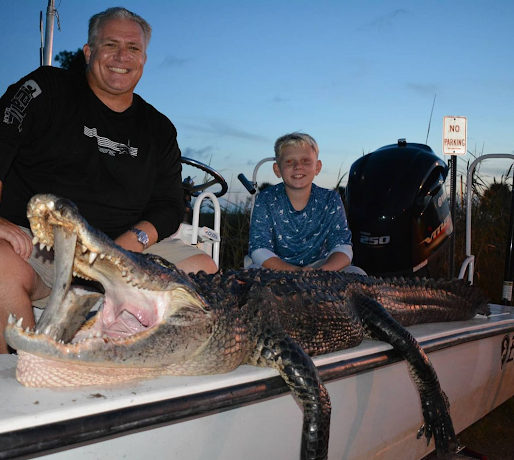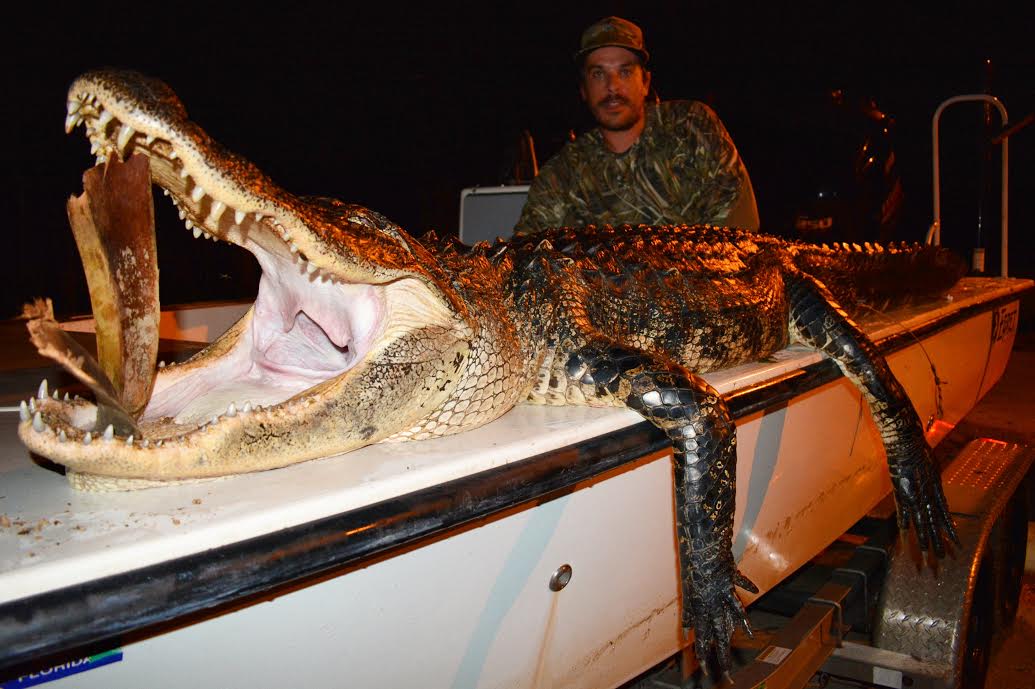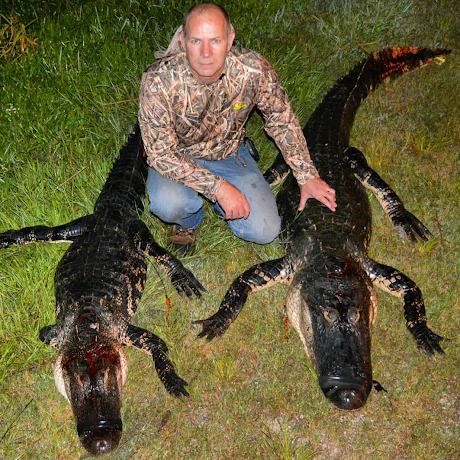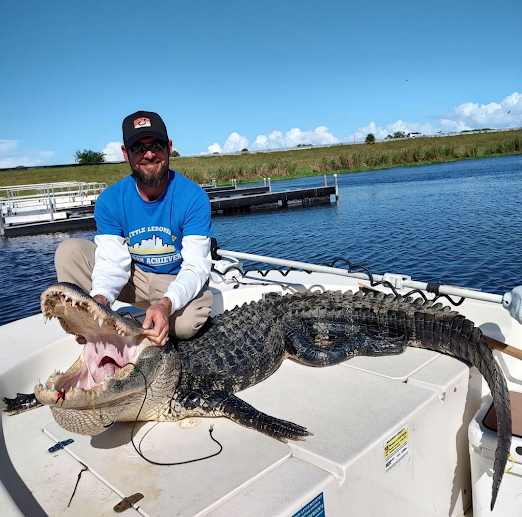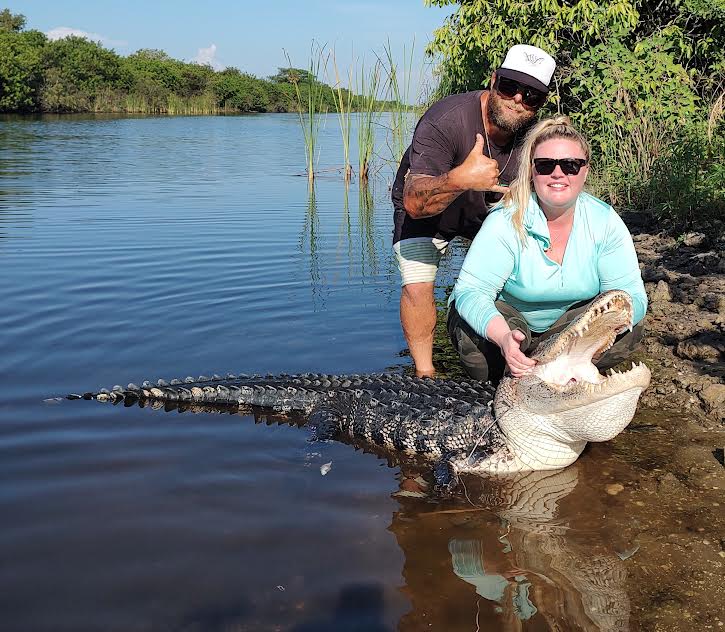(Now taking reservations for the 2023 Alligator Season on Lake Okeechobee)
Alligator hunting is wildly popular throughout all of Florida, but
as you can imagine it’s very limited in terms of how many permits are
allowed during each hunting season. Spots tend to be rather limited, but there’s no doubt
about it that gator hunting through County Line Charters is a once in a lifetime experience!
Although we’re technically fishing experts, Captain Eric has made sure to team up with one of the most legendary alligator hunting guides in all of South Florida, Captain Patrick Smith. Captain Patrick is a world-renowned gator hunting guide, so you can always have peace of mind knowing that you’ll be out there with two of the most experienced industry specialists when you’re hunting for alligators with us!
On this page we’ll be going over our comprehensive guide to gator hunting in Florida that we conduct on Lake Okeechobee in South Florida. Alligator hunting in Florida requires obtaining the proper permits and is only permitted during a short period of the fall months, so we’ll always be sure to help you with the planning process to better ensure your spot to experience this very unique type of hunting.
So below is everything you need to know about our gator hunts!
Alligator hunting is wildly popular throughout all of Florida, but
as you can imagine it’s very limited in terms of how many permits are
allowed during each hunting season. Spots tend to be rather limited, but there’s no doubt
about it that gator hunting through County Line Charters is a once in a lifetime experience!
Although we’re technically fishing experts, Captain Eric has made sure to team up with one of the most legendary alligator hunting guides in all of South Florida, Captain Patrick Smith. Captain Patrick is a world-renowned gator hunting guide, so you can always have peace of mind knowing that you’ll be out there with two of the most experienced industry specialists when you’re hunting for alligators with us!
On this page we’ll be going over our comprehensive guide to gator hunting in Florida that we conduct on Lake Okeechobee in South Florida. Alligator hunting in Florida requires obtaining the proper permits and is only permitted during a short period of the fall months, so we’ll always be sure to help you with the planning process to better ensure your spot to experience this very unique type of hunting.
So below is everything you need to know about our gator hunts!
Our Fundamental List
OF GATOR HUNTING EQUIPMENT
All of our gator hunting equipment is oriented towards heavy-duty commercial hunting uses. It’s always going to be absolutely critical to be working with highly durable, practical and of course functional equipment during gator hunts.
All of us at County Line Charters and Captain Patrick understand how important it is to conduct regular upkeep and maintenance on our equipment, and this is because we always want to ensure efficiency and safety while hunting for alligators.
The following list entails some of the most fundamental equipment that every alligator hunt will require:
All of us at County Line Charters and Captain Patrick understand how important it is to conduct regular upkeep and maintenance on our equipment, and this is because we always want to ensure efficiency and safety while hunting for alligators.
The following list entails some of the most fundamental equipment that every alligator hunt will require:
• Harpoon pole – dart, float, line, driver
• Bangstick
• Hands-free headlamps
• Gaff
• Electrical tape
• A sharp knife
• Fishing rod & snatch hooks
• Bone crusher harpoon pole
• Bangstick
• Hands-free headlamps
• Gaff
• Electrical tape
• A sharp knife
• Fishing rod & snatch hooks
• Bone crusher harpoon pole
There are certain extenuating circumstances that will necessitate much more equipment than this basic list, but you can be rest assured that our alligator hunting guides in Capt. Eric and Capt.Patrick will thoroughly go over the details of your alligator hunt and let you know why certain pieces of equipment are needed and how they’ll be utilized when the right moment strikes!
The following are some tips to keep in mind for each of the above pieces of gator hunting equipment:
Harpoon Pole Tips
The first thing you should keep in mind when it comes to utilizing your harpoon pole is that you should never use your pole like a lever, because this could potentially cause the pole to snap.
The best place to dart a gator is just behind the head in its soft spot, so this means it’s generally better to let a gator pass you if it’s coming towards you and then dart him once you have a better angle at the soft spot. It’s important to not dart a gator when it’s looking directly at you, because the dart may potentially bounce off of its head or even slide down its back providing little to no results.
A good idea for gator hunting enthusiasts to keep in mind is simply practicing your harpoon pole techniques before you’re actually hunting for alligators. Good throwing fundamentals can many times be the difference between snagging a prize gator and coming up empty handed.
It’s also important to always have at least one other dart pole on you during your gator hunting experience, which you’ll of course not have to worry about because we’ll have you covered! Having a second pole handy during a critical moment can give you a quick second shot at a gator, and of course you’ll always need an extra harpoon pole just in case one breaks or gets lost.
The following are some tips to keep in mind for each of the above pieces of gator hunting equipment:
Harpoon Pole Tips
The first thing you should keep in mind when it comes to utilizing your harpoon pole is that you should never use your pole like a lever, because this could potentially cause the pole to snap.
The best place to dart a gator is just behind the head in its soft spot, so this means it’s generally better to let a gator pass you if it’s coming towards you and then dart him once you have a better angle at the soft spot. It’s important to not dart a gator when it’s looking directly at you, because the dart may potentially bounce off of its head or even slide down its back providing little to no results.
A good idea for gator hunting enthusiasts to keep in mind is simply practicing your harpoon pole techniques before you’re actually hunting for alligators. Good throwing fundamentals can many times be the difference between snagging a prize gator and coming up empty handed.
It’s also important to always have at least one other dart pole on you during your gator hunting experience, which you’ll of course not have to worry about because we’ll have you covered! Having a second pole handy during a critical moment can give you a quick second shot at a gator, and of course you’ll always need an extra harpoon pole just in case one breaks or gets lost.
|
Tips For Using A Bangstick
Although bangsticks aren’t necessarily a requirement during gator hunts, it’s always a good idea to have one in the boat with you. This is because we’ll often be catching gators that are tangled up in vegetation and bushes, or underneath trees. |
Bangsticks also just so happen to be one of the most humane ways to dispatch an alligator, but of course there are many safety precautions that you must take while utilizing this type of dangerous gator hunting equipment.
The first thing you should know about the bangstick is that it should only be utilized underwater, and you should typically wait until you know for sure that the gator has been completely worn out. You truly can never be too careful when it comes to handling a bangstick while hunting for alligators, and you should NEVER fire a bangstick above water.
Another important tip when it comes to hunting gators with a bangstick is that you should only load the bangstick once you know you’re about to use it, and if something occurs and you don’t immediately use the bangstick then it should be unloaded until you’re once again ready for it.
Bangsticks are typically preferred over hand guns during alligator hunting because most boats will not provide a stable shooting platform, which can be a serious safety hazard. Gun shots are also very loud, which can be troublesome if we’re by chance near any homes at night.
Lighting Tips
A lot of gator hunts occur during the early morning or nighttime hours, so you’re going to need plenty of lights.
One thing you should always keep in mind while hunting for alligators is that it’s very important to conserve your light’s battery power as much as you can, and this is mainly because you’ll always need to make sure you have enough battery when you need your lights the most.
Many times it will be either Capt. Eric or Capt. Patrick handling the larger lights, and this is mainly because it’s a lot easier to follow only one light at a time while we’re navigating the boat in the dark.
You should also always make sure that you wear very dark clothing when you go gator hunting, and make sure that your clothes and hat aren’t reflective or produce glare.
We’ll also always make sure that the spot light’s power cord is properly rigged up just to make sure that there’s no chance that it will be pulled away from the battery.
Fishing Rod & Snatch Hooks
It’s important to know that hunting alligators with a fishing rod and snatch hooks will generally only work when you’re in open water, but when you are in open water your hook will actually be a great locator to help you harpoon the gator.
Gators can also travel over 100 yards once they’ve been hooked, so we’ll always help you out when it comes to making the proper judgment prior to tossing a hook in, and Capt. Eric and Capt. Alex will always let you know when it may be time to put the rod back in the boat and try another strategy.
Tips For Wrapping Up The Gator
Once you’ve successfully wrangled up a gator and it’s acting calm along the side of the boat, you’re still going to need to be VERY careful because there are still chances that it’ll have some bursts of energy left. At this point in the gator hunting experience it may seem like you’re in the clear, but the gator can still bite!
This is when you’ll typically load the bangstick and drop the gator under the water, and then strike the gator very hard right in the back of the head. A good strike with the bangstick should make the gator go limp, and this is when you’ll use the gaff and hook the gator right at the tip of the bottom jaw. It’s also important to note that you should never be fighting the gator with your gaff, so if it’s still fighting with you then you’ll need to bang it again.
This is the time when you’ll use your electric tape to tape up the gator’s mouth so it remains firmly shut, and then you’ll pull the gator up on to the boat. Once it’s on the boat you’ll then need to use your sharp knife sever the gator’s spine and ensure that it’s undoubtedly deceased.
Once you’ve successfully killed the gator, you’ll need to make sure you’re disinfecting your hands and arms. This is mainly because gators carry pretty nasty bacteria on them, so you’ll also always need to utilize an anti-bacterial agent if you incurred any scratches or cuts during the gator hunting process.
The first thing you should know about the bangstick is that it should only be utilized underwater, and you should typically wait until you know for sure that the gator has been completely worn out. You truly can never be too careful when it comes to handling a bangstick while hunting for alligators, and you should NEVER fire a bangstick above water.
Another important tip when it comes to hunting gators with a bangstick is that you should only load the bangstick once you know you’re about to use it, and if something occurs and you don’t immediately use the bangstick then it should be unloaded until you’re once again ready for it.
Bangsticks are typically preferred over hand guns during alligator hunting because most boats will not provide a stable shooting platform, which can be a serious safety hazard. Gun shots are also very loud, which can be troublesome if we’re by chance near any homes at night.
Lighting Tips
A lot of gator hunts occur during the early morning or nighttime hours, so you’re going to need plenty of lights.
One thing you should always keep in mind while hunting for alligators is that it’s very important to conserve your light’s battery power as much as you can, and this is mainly because you’ll always need to make sure you have enough battery when you need your lights the most.
Many times it will be either Capt. Eric or Capt. Patrick handling the larger lights, and this is mainly because it’s a lot easier to follow only one light at a time while we’re navigating the boat in the dark.
You should also always make sure that you wear very dark clothing when you go gator hunting, and make sure that your clothes and hat aren’t reflective or produce glare.
We’ll also always make sure that the spot light’s power cord is properly rigged up just to make sure that there’s no chance that it will be pulled away from the battery.
Fishing Rod & Snatch Hooks
It’s important to know that hunting alligators with a fishing rod and snatch hooks will generally only work when you’re in open water, but when you are in open water your hook will actually be a great locator to help you harpoon the gator.
Gators can also travel over 100 yards once they’ve been hooked, so we’ll always help you out when it comes to making the proper judgment prior to tossing a hook in, and Capt. Eric and Capt. Alex will always let you know when it may be time to put the rod back in the boat and try another strategy.
Tips For Wrapping Up The Gator
Once you’ve successfully wrangled up a gator and it’s acting calm along the side of the boat, you’re still going to need to be VERY careful because there are still chances that it’ll have some bursts of energy left. At this point in the gator hunting experience it may seem like you’re in the clear, but the gator can still bite!
This is when you’ll typically load the bangstick and drop the gator under the water, and then strike the gator very hard right in the back of the head. A good strike with the bangstick should make the gator go limp, and this is when you’ll use the gaff and hook the gator right at the tip of the bottom jaw. It’s also important to note that you should never be fighting the gator with your gaff, so if it’s still fighting with you then you’ll need to bang it again.
This is the time when you’ll use your electric tape to tape up the gator’s mouth so it remains firmly shut, and then you’ll pull the gator up on to the boat. Once it’s on the boat you’ll then need to use your sharp knife sever the gator’s spine and ensure that it’s undoubtedly deceased.
Once you’ve successfully killed the gator, you’ll need to make sure you’re disinfecting your hands and arms. This is mainly because gators carry pretty nasty bacteria on them, so you’ll also always need to utilize an anti-bacterial agent if you incurred any scratches or cuts during the gator hunting process.
Reach Out To The Gator Hunting Guides At County Line Charters To Learn More About Hunting For Alligators!
County Line Charters may be charter fishing specialists, but we also provide licensed alligator hunts that truly are an unparalleled experience. When you come out with Capt. Eric and Capt. Patrick on an alligator hunt, you’ll undoubtedly remember the entire hunting experience for many years to come because it’s one of the most exciting hunting experiences in the entire world!
So always feel free to reach out to us online or call us at 561-440-0312 and let us know how we can help set you up with a gator hunting reservation for the 2024 season!
So always feel free to reach out to us online or call us at 561-440-0312 and let us know how we can help set you up with a gator hunting reservation for the 2024 season!

